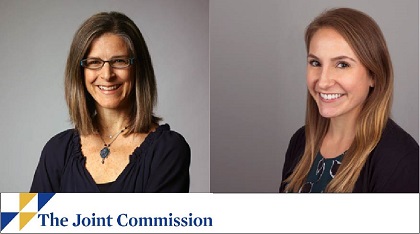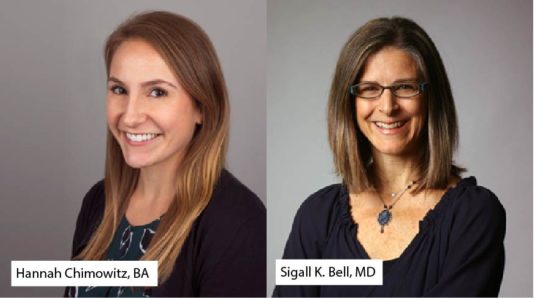
By Hannah Chimowitz, BA & Sigall K. Bell, MD – posted first on The Joint Commission Blog on March 1st 2018
 This blog post goes beyond the study “Empowering Informal Caregivers with Health Information: OpenNotes as a Safety Strategy” in the March 2018 issue of The Joint Commission Journal on Quality and Patient Safety.
This blog post goes beyond the study “Empowering Informal Caregivers with Health Information: OpenNotes as a Safety Strategy” in the March 2018 issue of The Joint Commission Journal on Quality and Patient Safety.
An estimated 43.5 million adults in the United States provide unpaid care to an adult or child for an average of 24.4 hours each week.1 More than half of these caregivers also work full time.2 Because patients supported by caregivers are elderly, frail, or chronically ill, informal caregiving represents a subset of health care interactions that are particularly complex, prone to errors, and costly.
Informal caregiving activities are numerous and wide-ranging, including assistance with daily living and health care needs and activities such as:
- medication administration
- coordination of care and transportation
- communication with health care providers
- advocating for the patient
Needless to say, informal caregivers in the United States experience high burdens. Unmet information needs should not add to this burden.
Need for Adequate Patient Information
Caregivers need concrete information to manage their loved one’s treatment, help make care decisions, and play a potential role in avoiding preventable patient readmissions or costly medical errors—but they often lack adequate information. Providing caregivers with easy online access to patient health information through a patient portal (with patient permission) could help better meet these needs.
The current rise in electronic access to personal health information and the benefits of such access present a rich opportunity to better support caregivers, a rapidly emerging health care priority.3 OpenNotes, an international movement urging doctors, nurses, therapists, and other providers to invite patients to read the notes they write to describe a visit, is empowering over 20 million patients and caregivers with transparent health information across the nation.4 As recently published in The Joint Commission Journal on Quality and Patient Safety, our team examined OpenNotes’ role in avoiding errors, delayed diagnosis or other ambulatory safety risks.
How OpenNotes Helps Caregivers
OpenNotes research has found that patients with poorer self-reported health were more likely to share their visit notes with others. At the same time, patients who shared online access to notes reported better self-care and medication adherence.5 A study6 of patient and caregiver perspectives on shared notes found that both parties perceived benefits, including:
- better understanding of patient health conditions
- better ability to remember the patient’s care plan
- more productive discussions about the patient’s care
- better agreement about the patient’s treatment plan
- improved ability to formulate questions for the doctor
In addition to these findings, OpenNotes can help fill critical information gaps, such as:
When caregivers cannot attend visits
- “My husband is very hard of hearing and so you can imagine, I mean, even with perfect hearing, I miss what doctors say sometimes. And he is really lost, so…it’s been a godsend that I can find out what the doctor told him.”
When patients speak limited English
- “I would like to know what the doctor said in case [my sister] couldn’t understand very well. OpenNotes is there for me, to teach me, for me to learn the communication between my sister and the doctor…and how I can help her in order to become safe and healthy.”
When patients are children or have complex care needs
- “My husband calls me the Chief Operating Officer of our family. With three kids, each with different schedules and different health concerns, access to the notes is a tremendously valuable tool to help me manage our health.”
Empowered Caregivers
In our study, caregivers reported that reading notes helped them better understand the rationale for tests and helped them follow through with tests and referrals. We also saw that as a result of reading notes, caregivers were more likely to check test results, potentially assisting with earlier recognition of abnormal results, a known ambulatory safety hazard.
In addition, caregivers who read notes reported improved relationships with health care providers including enhanced trust, teamwork, and goal alignment between the patient and clinician. Even caregivers who were already active in the patient’s care reported that reading notes made them more activated.
As we learn more about the burdens caregivers face, including emotional stress and unmet information needs, increasing efforts are being made to better understand and support them. Beyond improving caregiver well-being, improving caregiver access to health information can affect patient quality of care and safety.
OpenNotes can provide a simple, actionable, and scalable strategy to answer the call for better supporting caregivers with the information they need to do their critical work, and may improve the lives of the millions of Americans providing care to a rapidly aging and complex patient population.
Hannah Chimowitz, BA, is an OpenNotes Research Assistant at Beth Israel Deaconess Medical Center (BIDMC) in Boston. Ms. Chimowitz is involved in many OpenNotes research projects, specifically studying the impact of sharing notes with mental health and other vulnerable populations. Prior to BIDMC, she worked at the Institute for Human Values in Health Care at the Medical University of South Carolina in Charleston.
Sigall K. Bell, MD, is Director of Patient Safety and Discovery, OpenNotes, at BIDMC. Dr. Bell also is an Associate Professor of Medicine at Harvard Medical School in Boston. Dr. Bell leads the OpenNotes Patient Safety Initiative, a multi-site study examining the relationship between OpenNotes and safety-related outcomes. She also helps to create educational innovations through OpenNotes, working to enhance patient and family voices in medical education, and to empower youth to become activated patients.
References
Hounsell C, Jed Johnson W, Seals Carol Levine E, et al. Caregiving in the U.S. – AARP 2015 Report. 2014. https://www.aarp.org/content/dam/aarp/ppi/2015/caregiving-in-the-united-states-2015-report-revised.pdf. Accessed February 15, 2018.
Family Caregiver Alliance, Caregiving NC on. Caregiver Statistics: Work and Caregiving. https://www.caregiver.org/caregiver-statistics-work-and-caregiving. Published 2016. Accessed February 13, 2018.
Wolff JL, Feder J, Schulz R. Supporting Family Caregivers of Older Americans. N Engl J Med. 2016;375(26):2513-2515. doi:10.1056/NEJMp1612351
OpenNotes®. See Who’s Already Sharing Notes! https://www.opennotes.org/join/map/. Accessed February 21, 2018.
Jackson SL, Mejilla R, Darer JD, et al. Patients who share transparent visit notes with others: Characteristics, risks, and benefits. J Med Internet Res. 2014;16(11). doi:10.2196/jmir.3363
Wolff JL, Darer JD, Berger A, et al. Inviting patients and care partners to read doctors’ notes: OpenNotes and shared access to electronic medical records. J Am Med Inform Assoc. 2016;157(7):461-470. doi:10.1093/jamia/ocw108
Hannah Chimowitz is an OpenNotes Research Assistant
Dr. Sigall K. Bell is the OpenNotes Director of Patient Safety and Discovery, Beth Israel Deaconess Medical Center and Associate Professor of Medicine, Harvard Medical School




You must be logged in to post a comment.